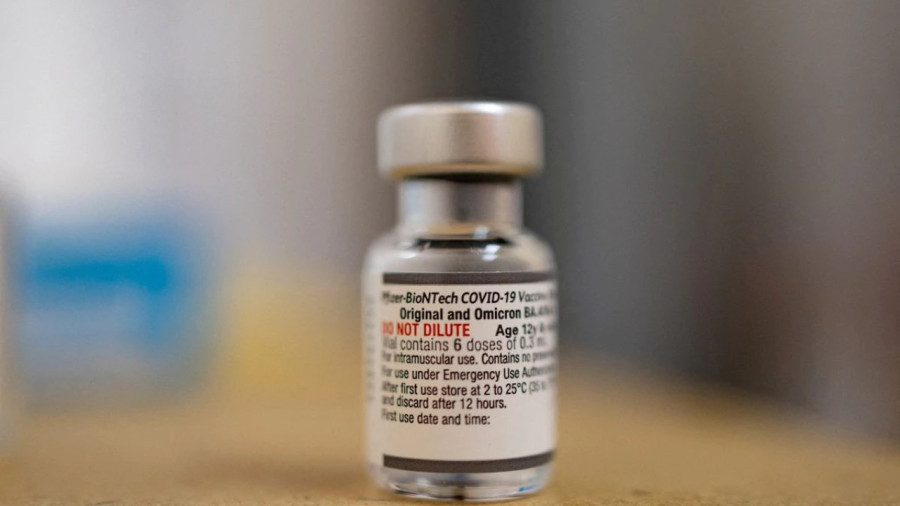Health
Nepal grants emergency use approval to Pfizer-BioNTech’s bivalent vaccine
Due to the delay in giving permission, supply of the vaccine by Covax could not start on time.
Arjun Poudel
Amid the increasing risk of a new surge in Covid infections, a meeting of the Drug Advisory Committee on Tuesday granted emergency use approval to Pfizer-BioNtech’s bivalent vaccine.
Officials at the Ministry of Health and Population said that emergency use authorization is necessary to import and use the vaccine and medicines in the country.
“A meeting of the Drug Advisory Committee held today [Tuesday] granted emergency use approval to Pfizer-BioNTech’s bivalent vaccine,” said Santosh KC, spokesperson for the Department of Drug Administration.
As per the new provision, the emergency use authorisation should be approved by the Drug Advisory Committee.
The bivalent Covid vaccine includes a component of the original virus strain to provide broad protection against Covid and a part of the Omicron variant.
The vaccine is called bivalent Covid vaccine, as it contains two components. Doctors say a bivalent Covid vaccine may also be referred to as an “updated” Covid vaccine booster dose.
Officials at the Health Ministry said Nepal is all set to receive 1.5 million doses of bivalent Covid vaccine from the COVAX facility, the international vaccine-sharing scheme backed by the United Nations.
It is part of the 9.2 million doses promised to Nepal by the facility. Of the 9.2 million doses of adult Pfizer-BioNTech vaccine committed by the facility, only around three million have been supplied so far.
Earlier, the Health Ministry officials refused to accept vaccine doses offered by the facility as they were nearing expiry. The facility then offered bivalent vaccine doses.
Officials said the bivalent vaccine doses were supposed to be delivered in November, but due to the failure to secure emergency use authorization on time, the supply has been delayed.
Christmas and New Year have further delayed the supply, according to officials at the Department of Health Services.
“We hope the doses will arrive around mid-January,” said Dr Bibek Kumar Lal, director at the Family Welfare Division under the Department of Health Services.
Nepal so far has used Covid vaccines developed by University of Oxford and pharmaceutical giant AstraZeneca manufactured in various countries of Europe, India and Japan, the Chinese Vero Cell, and US-made Janssen, Moderna, and Pfizer-BioNTech.
All vaccines used in Nepal had received emergency use authorization. The Department of Health Services itself had sought permission from the drug department to bring vaccines offered by Covax. The department also provided approval to Vero Cell, Sinovac Corona Vac, Covaxin and Sputnik V vaccines.
The Health Ministry had decided to administer the second booster shots to vulnerable groups—elderly people above 60 years old, those having compromised immunity and frontline health workers, months ago, but the vaccination has not yet been started.
Experts say vaccination is the only reliable way to prevent severity and deaths from coronavirus infections and suggest administering second booster shots at the earliest.
“Our own experiences from the third wave of the pandemic show that the infection is less severe in the vaccinated population,” said Dr Sher Bahadur Pun. “New cases have been surging in China and other countries where the Nepalis have a high mobility rate. Authorities concerned should do everything to administer vaccines at the earliest.”
Nepal had started administering booster shots on January 17, but the uptake of the jabs is very low. So far, 7,972,791 people, or 27.3 percent of the total population, have received booster shots. It has been around a year since most people took them.
Several studies, including the one carried out in Nepal, show that immunity achieved from vaccination or infection wanes after six months of vaccination or natural infection.
“New cases of infection have been surging in China, Japan, South Korea and other countries, whose vaccine coverage rate is comparatively better,” said Dr Prabhat Adhikari, an infectious disease expert. “We do not know the exact data of China’s infection, but what is proved is that the vaccine is less effective against the new virus variant, which is more virulent than other variants. The authorities concerned should try to administer vaccines to the maximum number of population at the earliest.”
So far, 22,324,923 or 76.5 percent of the total population has been fully immunised.
Nepal has so far received Covid vaccines of various brands—AstraZeneca, Vero Cell, Moderna, Janssen, Sinovac-CoronaVac, and Pfizer-BioNTech—including the paediatric doses.




 14.24°C Kathmandu
14.24°C Kathmandu















